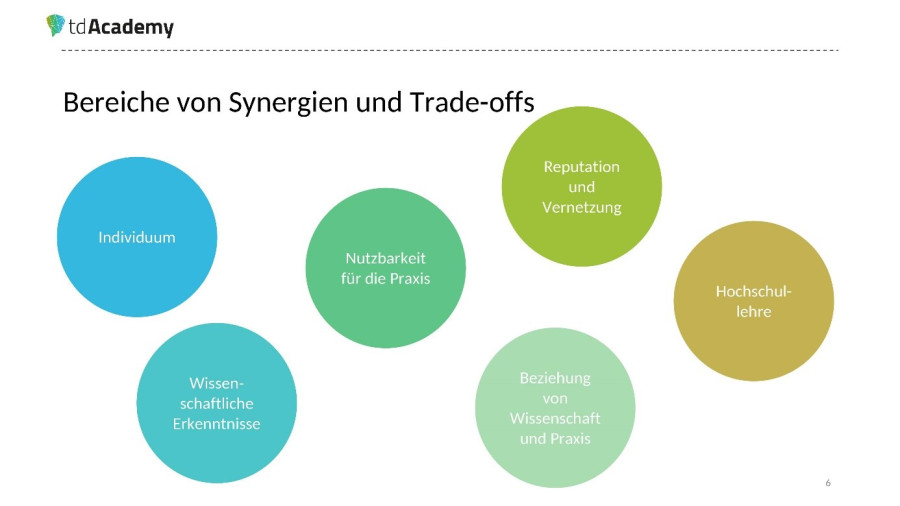Source: Nagy, Marg, Theiler, 2024
On June 12, 2024, Topic Lines 1 (societal impact) and 2 (scientific impact) of the tdAcademy project organized a digital workshop on interlinkages of scientific and societal impact of transdisciplinary research. In the first part, Oskar Marg (ISOE), Lena Theiler (ISOE) and Emilia Nagy (ZTG/TU Berlin) presented the preliminary findings from the joint work on synergies and trade-offs of transdisciplinary research and discussed them with participants from science and practice who have transdisciplinary research experience themselves. In order to expand the empirical basis for the interlinkages, three focus groups (2x science, 1x practice) were also conducted in the second part of the workshop. The focus of these discussions was on strategies for dealing with conflicting goals and strengthening synergies. The focus groups were co-moderated by Alexandra Lux (ISOE), Martina Schäfer (ZTG/TU Berlin) and Annabell Lamberth (ZTG/TU Berlin).
Background and objectives
Within the framework of Interface 1, the work that was realized quite separately in the first funding phase in Topic Lines 1 "Societal Impacts" and 2 "Scientific Impacts" has been continued and brought together. Since the start of the second funding phase, Oskar Marg and Lena Theiler (ISOE) and Emilia Nagy (ZTG/TU Berlin) have been investigating the relationships between activities aimed at generating both scientific and social impacts of transdisciplinary research. The integrative secondary analysis of the data collected during the first funding phase indicates that these two objectives can lead to trade-offs (conflicts of objectives). However, the simultaneous pursuit of both objectives also has the potential to complement each other and thus create synergies.
The high relevance of this issue for the TD community was already evident at a workshop on synergies and trade-offs in transdisciplinary research held at the PARTWiss conference in November 2023. The interface workshop in June 2024 continued and deepened the fruitful exchange with experienced transdisciplinary researchers and served as an opportunity to collect further data .
Course of the workshop
In the first part of the workshop, preliminary results of the secondary analysis were presented focusing on the synergies and trade-offs of transdisciplinary research and its most common types. Subsequent reflection small group discussions on the interim results led to the general conclusion that the special features of transdisciplinary research from the perspective of science have already been relatively well researched, while reflection from the perspective of practitioners is still widely lacking. Recording and analysis of both perspectives in interface 1 enables a comprehensive comparison. It is assumed that possible synergies and conflicts of interest are perceived differently from the two perspectives due to different interests and backgrounds. There was agreement that transdisciplinary projects open up a space for reflection beyond the boundaries of science: Scientists* can, for example, validate assumptions of models in practice, while simultaneously becoming aware of the limits of their knowledge about how practice actually "works" become visible.
Another focus of the discussion concerned transdisciplinary teaching. On the one hand, it leads to positive, real-life learning effects for students through concrete collaboration with practitioners. On the other hand, it requires a great deal of effort from lecturers and can create pressure on students to produce both good study results and practice-relevant findings. Another conflict of objectives is that results relevant to practice are often difficult to generalize or transfer due to the contextual reference. Communication and expectation management between science and practice regarding these conflicting goals should be actively addressed. Additionally, science should reflect on its social responsibility in terms of research ethics, especially in research approaches that carry out transdisciplinary experiments in real-world contexts. At the individual level, the discussion also addressed the the influence that participation in a transdisciplinary research project has on the respective careers of project members - both in academia and practice. The second part of the workshop was designed as an empirical format: Three focus groups (2x academia, 1x practitioners) discussed the strategies used by academics and practitioners from different contexts and career stages use when dealing with synergies and trade-offs. In the moderated small groups, the participants were able to share their ideas and reflect on their experiences. The discussions will be analysed in the coming months and the results will be made available in various formats.
We would like to thank everyone involved for their participation and valuable input!

